A Year of Herbs: Ginger
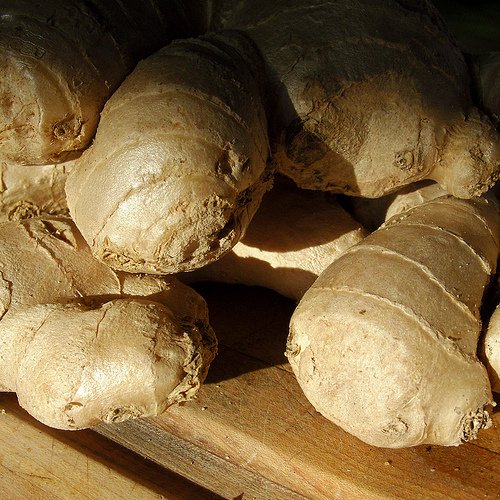
Image by vieuxbandit
As I went to write this next post for my Year of Herbs series, I had been thinking of doing comfrey or yarrow. However, I’ve really been enjoying learning about herbs that we all have right at our fingertips (like garlic and onion, or fennel and dill). Ginger seemed a perfect choice to study up on next!
Truthfully, I had never, ever thought of ginger as a “herb” (or at least, a medicinal one) until I began studying up on herbs. Suddenly I was just floored to realize it’s useful qualities and the fact that it was readily available at any old grocery store!
One little caveat– based on my current commitment to spend a bit less time blogging and writing complex posts, this hasn’t been nearly as thoroughly researched as my Garlic post. This is just what I was able to come up with in a more reasonable amount of time (and it took me several weeks!) and some of the ways that I have been learning to use it personally. I hope you still find it helpful to encourage you along in your own studies and use of herbs!
History
Ginger originates from tropical Asia but has been used in the West for at least 2000 years. It has traditionally been used as a warming herb, and in the 18th century began to be added to remedies to help reduce irritation on the stomach. It is still sometimes used this way in Chinese medicine, to reduce the toxicity of some of the more harsh herbs.
General Qualities and Uses
Ginger is known to: improve circulation, aid digestion, reduce nausea, help heartburn, reduce aches and pains, increase warmth, decrease congestion. Also known to be anti-inflammatory, relaxing, detoxifying.
Active ingredients in ginger are turpines (yes, similar to turpentine) and oleo-resin compounds called Gingerols. They are antiseptic, lymph-cleansing, circulation-stimulating, and mild constipation-relieving qualities, and potent perspiration inducing action.
It is also a good “carrier herb” which means it helps to bind several herbs together and help the entire formula to work more deeply and effectively. Great to add in to a combination with other herbs.
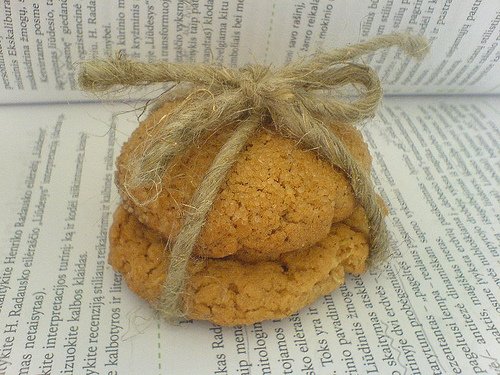
Image by rusvalpauke
Methods of Use
Powder– Ensure that you’re using high quality ginger powder (even the stuff from the grocery store is fine if it’s actually fresh). I have a nice big bag of very fresh ginger powder from Oregon Spice Company that works well, and another great place to purchase fresh ginger would be Mountain Rose Herbs.
Fresh ginger root-Buy one that looks particularly fresh from the market or grocery store. It will stay nicely in the fridge for several weeks. Just cut off chunks as needed.
Capsules– These are basically just powdered ginger in a capsule, but some people may find it easier to take. These are available at pretty much any health food or supplement store.
Dried whole or chunks– These can be used similarly to powdered, or could also be boiled just like fresh ginger root.
Ginger Oil– It is also available as an essential oil, though I will confess that I have not tried it in this form and have no found a lot of information on how to safely use it, as oils are much more concentrated than these other forms.
Particular Uses
Low Blood Pressure– Take ginger in any form daily. This is only a temporary help, so underlying issues should definitely still be looked into.
Circulation– Ginger really speeds up circulation, brings warmth and helps to flush different areas of the body. Excellent to use a hot cup of ginger tea for this purpose (with lemon and honey is nice), or a bath is a great option (see bath description under Fevers). I tried this the last time I had some mild fever/chills with a bad cold, and the bath was so soothing and definitely helped to warm me up and relax me enough to go to sleep quickly.
Colds/Flus– Really soothing to symptoms of colds/flu (congestion, chills, fever, aches and pains). With that same cold, I made for myself a “winter sickie tea” as I called it, and it included a heaping dose of ginger. Sipping on my tea throughout the day helped so much to warm and decongest me and allow me to function as well as possible while getting over my cold. You can make a tea like this using any form of ginger (fresh, dried, powdered) by simmering it in boiling water.
Congestion– Ginger helps in two different sort of ways. Very helpful for general congestion within the body, particularly the build up of toxins or when major organs (like the liver or the digestive system) are rather congested and not functioning well. It helps to speed up the circulation, break down congestion and flush toxins to get things working more smoothly again. In regards to congestion from a head cold, it breaks up mucus and helps to flush it out. Whenever I would get too congested with my last head cold, a big mug of tea with ginger would do the trick. Within less than a half hour, I would start to notice that I was blowing my nose more frequently and then within 15-20 minutes, suddenly I began to feel very noticeably less congested.
Constipation– Acts as a stimulant to the digestive system and helps to get things moving, but without the harsh action of a laxative. One option for desperate times is a ginger enema (and quite frankly I have no clue how to administer an enema nor tips for you on how to do so, but have only read that it is helpful!). Taking it orally is generally useful enough, mixing either powdered ginger with water and drinking 2-3 times a day, or simmering fresh ginger to make a tea (and simmering with flax seeds, and also honey or molasses adds to the effectiveness of this brew). This is considered quite safe for children as well as adults (though as always, use a much smaller/weaker dose when giving anything herbal to children).
Digestion– Ginger stimulates the digestive juices which is why it is so helpful for cases of indigestion. It relieves gas, cramping, heartburn. It can be taken either before OR after a meal to improve digestion. If a meal is sitting heavily with you, sipping on a mug of ginger tea afterwords will likely be very helpful. I have used it over and over again in this regard, especially while pregnant, with excellent results.
Fever– Because it increases circulation and stimulates perspiration, it flushes out toxins and can help a fever to leave the body faster. One excellent way to use ginger with a fever is a soothing ginger bath. You can use anywhere from 2-6 Tbsp of ginger or even up to 1/2 a cup (though you should work up the amount slowly if you are not used to it). Just toss the powdered ginger right in the tub as it’s filling up and then soak in the tub while sipping on a glass of water. You will definitely notice the warmth, but will also find that fever and chills will most likely decrease after a while.
Ginger Bath– Described above. Good for fever/chills/aches/pains. Also for detoxifying, increasing circulation of the body in general.
Ginger Poultice– Used externally, over an area of congestion or for inflamed, aching, sprained or stiff skin, muscles or appendages. Mix the powder into a past with water and spread it about 1/8 inch thick on a cloth (like cotton or wool). Put it over something to catch the drips and add enough boiling water to wet and heat the herbs (but not wash them away). When it’s cool enough for the skin, apply and secure using a towel, etc. to hold it in place. Can add a hot water bottle or heating pad on top to increase it’s effectiveness.
Headaches and Migraines– Often helpful because many headaches apparently have their root cause in poor digestion and circulation (something I’d never heard before until studying ginger!). One great way to use ginger is this case is to soak your feet in a strong ginger bath. Ginger can also be taken in capsule or tea form for a headache, but may take longer to work that way.
Heartburn– Aside from Slippery Elm (which I take in lozenges made by a company called Thayer’s), ginger is my go-to herb when I am pregnant and dealing with heartburn. I assume the reason it helps so much is because the heartburn is stemming from indigestion, which is worsened in pregnancy by hormones that slow down digestion and by increasing pressure on the stomach as the uterus expands. Whatever the reason, sipping on ginger tea throughout the day, but especially before and after meals, is sooo helpful for me in keeping the heartburn to a manageable level!
Inflammation– Can be very helpful for things like arthritis, tendonitis, sprains, etc. It is very anti-inflammatory and can be used externally (as a poultice, as mentioned above (Ginger Poultice) or taken internally. One suggested internal dose for inflammation is 1/3 tsp powdered ginger 3 times a day.
Lungs– Ginger can be taken both internally and externally (in a poultice put over the chest) to help with lung irritations (like asthma, bronchitis, pneumonia) or any kind of congestion.
Menstruation– Helpful for cramps especially, because of antispasmodic properties and because of the increase circulation and blood-flow. Could use as a tea/capsule, or take a bath or use a warm poultice on lower abdomen.
Mumps (or swollen lymph glands)- Ginger baths are very helpful for relieving the swelling, and can also be used internally.
Nausea– Pregnant women take note! Ginger is your friend if you suffer from morning sickness! Sipping on ginger teas can be very helpful for mild nausea that comes and goes. For more persistent nausea, try taking ginger either in capsules, or just 1/2 to 1 tsp of powdered ginger with some water. I’ve also known someone who just ate small chunks of fresh ginger directly and said it really did the trick. Taken directly in the mouth it helps to give much more immediate relief. Sometimes it helps to take several doses 15 minutes apart to soothe extended nausea. If you struggle with motion sickness, taking a dose of ginger before your begin to travel and also while you are traveling can help to keep the nausea at bay. You could also mix the ginger powder with a little honey or molasses to get it down more easily. One book noted that while ginger will help with nausea in about 9/10 people, there are some who don’t find it effective. For those people, peppermint may be a more effective nausea remedy.
Skin Issues– A ginger bath can be helpful for rash or other skin irritations. Because it increases the circulation and flushes out toxins, it can clear out what is happening on the inside of the body that is being eliminated through the skin (because often our skin is just showing that there is something happening inside the body– it’s a symptom of something else).
Stimulant and Tonic– Ginger can be invigorating, when lacking energy or for those in cold climates during the winter. Something like a ginger tea or bath will icnrase circulation and warmth and act as a pick-me-up.
Sore Throat– One book suggested using a mixture of ginger powder and clove powder in equal parts (ginger for anti-inflammatory properties and clove for pain relief), then take 1 tsp of the mixed powders and stir into 2 Tbsp of olive oil. Use 1/2 tsp of this herbal oil, swallowing slowly to allow it to coat throat. Or gargle with ginger tea, or the ginger/clove mixture in water as a gargle. Could also make small balls with honey and ginger to suck on.
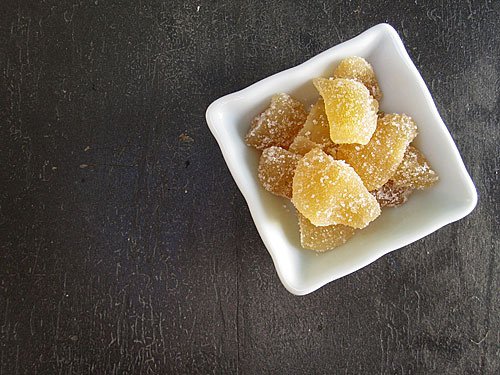
Image by thedeliciouslife
Warning/Contraindication
*Ginger can sometimes be too stimulating for some people. Start with lower doses, whether orally or in a ginger bath or whatever, and work up if it is well tolerated.
*Because of it’s mild laxative-resembling qualities, taking too much can be too stimulating for the intestines in some people. Start slow on doses and work up as your body tolerates it.
*If the stomach is already upset or over-producing acid (or in an ulcerous state) avoid too much ginger as this may cause more irritation.
*Though ginger is safe in pregnancy and useful for nausea, still use it with respect and do not use extremely large doses. If in doubt, ask your midwife or naturopath. Sticking with fresh ginger teas makes it hard to take in too much.
Have you tried using ginger in a medicinal or healing manner? What have you found it to be useful for? Have you ever thought of ginger as a “herb”, for that matter?

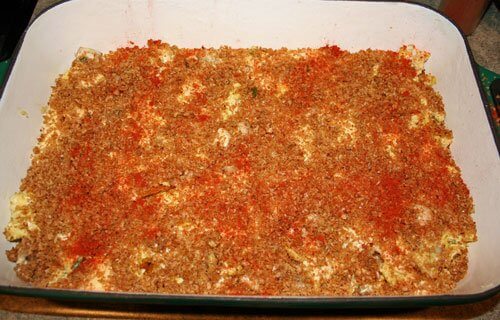
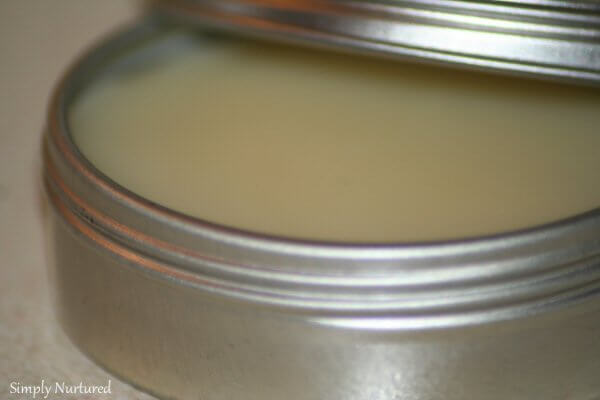
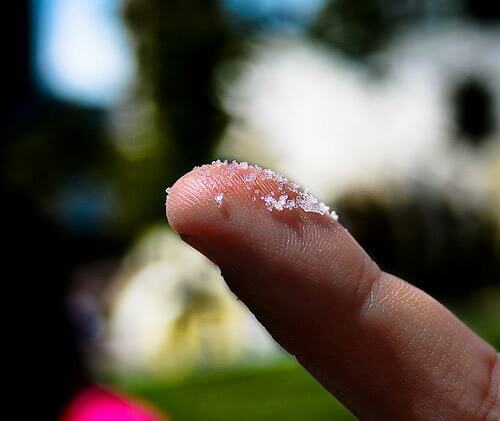
Thanks for the info! I have used it for morning sickness, with some success.
We’ve used it with honey for sore throats, and I have heard it’s good for GAPS-type-people who want to heal the gut, that it is an antiinflammatory so it would facilitate healing.
I agree about looking into herbs that are readily available, use what’s easy first, right? 🙂
.-= Cara @ Health Home and Happiness´s last blog ..Lifestyle and Breastmilk Supply =-.
Although I know this isn’t a really pure form of ginger, I found the ginger Altoids really helpful with my intense, all day, 22 week long morning sickness.
Wow! What a list!
I have used ginger tea before, and taken a ginger bath, but I had no idea its extent of beneficial properties went that far! Taking it as a hot tea I’ve found it definitely helps with congestion. I suffer from migraines and the foot bath is a great idea–thanks!
I make ginger “tea” for my family during the winter, especially when someone is sick in the family (thank God it wasn’t the case this year). I peel the ginger and slice it thinly (about 7 slices), add some boiled water and add lemon and raw honey. I actually made it last night and it tastes good and it is a great drink before going to sleep. Thank you for your posts. I’m just amazed how you get things done with three kids, blogging, and making almost everything from scratch. Keep it up girl!
I have pretty bad PCOS and when the pains start I get out ginger snaps, ginger ale and pretty much start eating ginger! Brilliant post!
.-= Notes From The Frugal Trenches´s last blog ..Starting Out On The Right Foot =-.
I have used ginger with this pregnancy, and have yet to be sick. With all of my other pregnancies, I have ended up in the hospital because I have lost so much weight and been unable to eat from nausea. It has worked great for me! I have been cooking with it breakfast, lunch and dinner and just eating it with my diet. I am actually nervous about going to blissdom and not having ginger there. I might need to pack some for the trip. (-: This was a great post!
.-= Rene Christensen´s last blog ..Free Food At Dennys =-.
I love ginger and take it almost everyday. I take it in all different forms. My favorite way to use it is in toothpaste!
Thanks so much for these in-depth herbal studies. THey are so helpful, informative, and interesting!
Sarah M
This was so informative, I can’t imagine what this would have been if you had had more time, Stephanie, LOL! Thanks!
.-= Amanda´s last blog ..Daybook =-.
When I was pregnant and dealing with morning sickness (I was later diagnosed with hyperemesis gravidarium), I got an organic lemon ginger green tea and a lemon ginger herbal tea that with honey helped some with settling my stomach.
My maternal grandmother made a ginger tea that she would give us to help with menstrual cramps but never got the recipe from her.
I love the taste of ginger.
I have used ginger during my current pregnancy. My naturopath suggested putting a small piece into my smoothie every morning. It has really helped. She said that anything put into a smoothie digests easier and thus your body is better able to absorb the medicinal properties. The other herb that I have put into my smoothies is tumeric. I swear it has helped with general aches and pains of pregnancy. I love it, too!
Thank you so much for this post! I recently used fresh ginger in a recipe and put the rest in the freezer, now I know what to do with it. 🙂
Oh yes! I love ginger! I have used it as a tea (steep fresh ginger in boiled water for several minutes) and added in lemon, honey and powdered red peppper for a morning wake up tea. Also for tummy upsets and nausea ~ that would be just the ginger and the honey. It is SO good! Thanks for posting on such informative and beneficial topics.
Blessings,
Camille
I heard Of ginger tea and baths. Its pretty amazing.
I kind of wanted to try a Ginger bath, because I heard That toxins can actually keep you from losing weight, and after 2 kids I cant lose this last 30 lbs. It just wont happen! But Im breastfeeding and Im really not sure if it would be ok to do while Breastfeeding, so I will have to wait I guess. I cant find anything that says its ok.
During which part of the day, one should take ginger with honey? Whether it is recommended to take on empty stomach or after food?
Ginger is also VERY easy to grow…and PRETTY in the garden! Very tropical-looking. Buy an organic Rhizome(sort of a root) from the store, break it apart to have at least one node each and plant. Google “growing ginger” and you’ll find out more! I had 4 pcs last year that turned into 16 in one year…and it has a much stronger and more tasty flavor when grown fresh (as do most things when you grow them!). Also freezing ginger whole is a great way to preserve it
i love ginger! i buy fresh ginger at a local asian market..much cheaper than the normal grocery stores..and chop/slice it up and eat it like potato chips! with water nearby at all time, of course! consequently, i drink tons of water! but, all in all, i probably consume about six or seven pounds of ginger root a week..give or take. it seems to give me a real feeling of vitality. otherwise, i don’t take it for any special reason. i do love the flavor..what i buy HAS to be super fresh..like a fresh, crisp apple almost. i have become quite the ginger root snot these days! (well, lets say..for about ten years or more!) thanks for the post!
I’ve been running fresh ginger through the juicer when I make vegetable juice or even carrot/beet/apple juice. Makes it a little spicy, but good. Seems like an easy way to take it in, especially if you already juice.
Drinking ginger tea can also aid in weight loss. There are really a lot of health benefits that we can get from ginger root.
Some people are very sensitive to ginger, and can develop headaches, burning mouth syndrome, or gastritis from it. If someone is considering using ginger for medicinal purposes who has not used it before, s/he should consult a doctor first.
Fresh piece of
ginger for a bad toothache. lost a filling and ate something sweet and after brushing and rinsing the pain just would not go away. I placed a small piece of fresh ginger in the place where the filling was and it burned a little. The pain went away until I could make it to the dentist.
Wonderful blog! Great article and the comments left are also good.
Enema…
I have never heard of using ginger in the enema water solution.
Read in the book Prescription For Nutritional Healing how to administer a enema.
A garlic or catnip tea enema is listed in that book for fever reduction.
I have given a few enemas in my home. They work! Not hard to give. A very good natural home remedy for the children.
Check with your naturopathic doctor before giving a enema.
Blessings